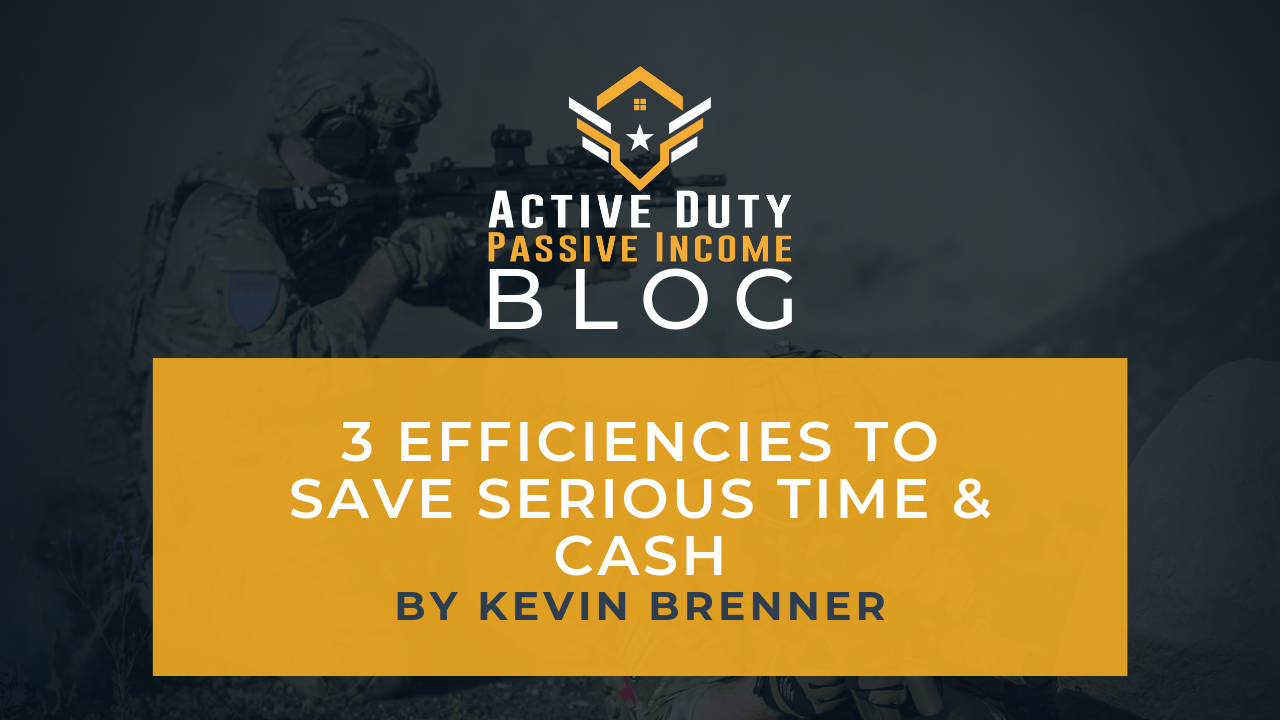Building Efficiencies
Why are real estate investors called investors in the first place? What’s the difference between folks like us who buy low and sell high and John Smith who buys a nice home for his family and sells for appreciation 30 years down the road? On the surface, the concept is the same. Most investors eventually taste the sweet nectar of appreciation when they execute their exit strategy. Similarly, John Smith will pay down the debt on his house and be sitting on a fat stack of equity which he can leverage.
According to Investopedia.com, an investor is “any person or entity who commits capital with the expectation of receiving financial returns”. John Smith may end up with some financial returns, but his primary concern is to provide shelter for his family. As investors, though we are also providing shelter for people and/or businesses, we are primarily concerned with our financial return. Risk is everywhere. Returns mitigate risk and provide opportunities. With this in mind, it’s wise to build a real estate investment strategy that fast tracks these consistent profits, mitigates upfront risk, and drives opportunity.
It’s important to note that every property is different and strategies need to be tweaked to fulfill the requirements of each project. Building core efficiencies in your business model will help save you time, energy, and money. Remember, the wise investor is handsomely rewarded down the road because they were brave enough to see what others could not. Utilizing strategies that minimize overhead and reduce time-wasting will help you realize your reward earlier than you may have anticipated.
1. Know Your Market
Most investors preach the above concept to anyone who will listen. While they are not wrong, the market they are referring to is the specific microeconomic market region where their investments are located. I want to clue you in on a more general meaning of the term market. In a business, your market broadly refers to who you are selling your product or providing your services. For example, you are a classic Buy and Hold investor. Who are you providing services to? The answer is simple – your market is your tenant base. Given this fact, it is wise to spend a significant amount of time and energy researching your market before jumping into an investment. You should have a firm grasp on neighborhood market rent, rental trends, tenant preferences, tenant demographics, tenant median income, local vacancy statistics, and population change statistics. As a Buy and Hold investor, you are looking for long term, steady tenant income that will offset your expenses and provide reasonable cash flow over the life of your investment. Knowing what tenants value in a dwelling will help you assign fair market rental value to each of your investment properties. For instance, do tenants in your market prefer dishwashers? Will an in-unit washer and dryer justify a $75/month rent increase? Do tenants desire off-street parking?
All of these things need to be researched and built into your plan before purchasing the property. If you are stuck and don’t know where to begin to find this data, try reaching out to some local property managers or real estate agents. Look for online ads on Trulia or Zillow to get an idea of what amenities tenants in your market are willing to pay for. Remember, the savvy investor does not run exceptionally high grade (or low grade) properties. Instead, they capitalize on stability by providing suitable housing for working-class tenants. Why would you want to rent to working-class folks instead of upper class? Because when the inevitable market dip, or recession occurs, what class of assets will be affected first? Yep, the top of the line A class luxury properties. You can mitigate this risk by adjusting your target market to a more stable class of properties that will be more resilient to economic downturns. In the long run, this strategy will help shield you from the effects of an economic housing recession. No matter what, people still need a place to live and call home.
2. Leverage Online Systems
Real estate investors are entrepreneurs. Any entrepreneur will tell you that the key to turning profits is not building a business and holding onto it forever. Instead, it’s building a streamlined business packed with efficiencies that provides its owner consistent cash flow over time. The higher the cash flow, the higher the valuation of the company, which may lead to an acquisition that will leave the owner with a nice paycheck. Additionally, this gives the ability to rinse and repeat with a whole new venture. That’s the core of entrepreneurship in America. So how do these entrepreneurs streamline and add value to their business? To start, they look for online systems that both save time and add revenue (or value) to the company.
As a real estate investor, look into online property management systems, accounting software, CRMs, marketing tools, and social media to both reduce time-wasting and generate new leads for your business. Remember the goal of investing – to receive financial returns from a previous capital injection. If you spend the majority of your day buried in your bookkeeping or bent over the tenant’s toilet trying to fix a leak, how are you supposed to realize the financial returns you so desperately crave? You MUST build systems that allow you the time to focus on not only current business but also future business and growth.
3. Delegation
Some of the greatest efficiencies seem the most counterintuitive to business growth that a lot of investors tend to avoid them. I’m talking about employees. You may have found success as a standalone investor or landlord managing a small portfolio. If growing your business is not your goal, then good news, you don’t have to. Perhaps you are content at your W-2 job and have found that your investments are providing you and your family with the ideal supplemental income. If that’s not the case, then you may have considered growing your portfolio and generating more business. While online systems are a good start, eventually you will have to bring additional people onto your team. As a business owner running a growing company, you can’t stay a technician forever. If you want to grow year over year, then you simply cannot spend your days swinging hammers. You have to be constantly optimizing your business, building systems, and generating new leads that will help your company grow. Resulting in added revenue to your bottom line, capital for future projects, and ultimately money in your pocket.
Take the time to learn how to hire smart. You will have to run background checks, interview prospective employees, and determine if they will be a good fit for your business. You need someone willing to buy into your business goals and objectives, share similar core values, and possess skills that you may have not yet necessarily honed. While you may be paying for an employee’s salary and benefits, their work should generate two to three times that in revenue! Play the long game and hire smart to grow your business.
Summary
Developing a core strategy for your business is critical to the success and vitality of your company. You don’t have to do it alone. Take advantage of all of the efficiencies out there to develop leads, manage operations, hire extra help, and grow. It’s all about MASSIVE ACTION. What are you doing today that will lead to future success tomorrow?

Kevin Brenner is an Active Duty Air Force Captain, ADPI Hero, REIA creator, blogger, and an active multifamily investor. You can reach out to him through the ADPI Facebook group, follow him on Instagram @investorKev, or email him directly at [email protected].








